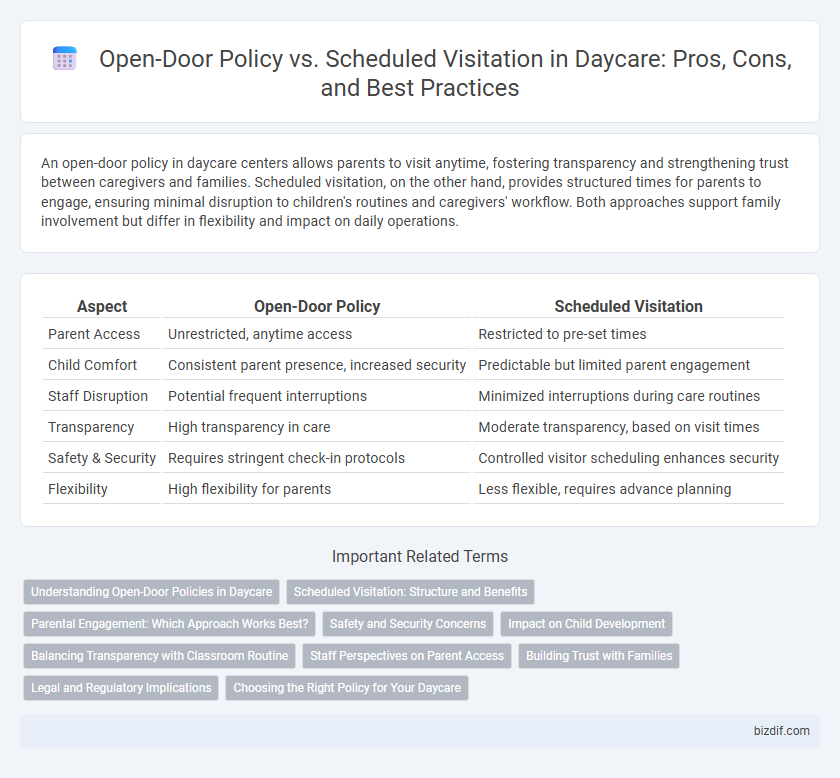An open-door policy in daycare centers allows parents to visit anytime, fostering transparency and strengthening trust between caregivers and families. Scheduled visitation, on the other hand, provides structured times for parents to engage, ensuring minimal disruption to children's routines and caregivers' workflow. Both approaches support family involvement but differ in flexibility and impact on daily operations.
Table of Comparison
| Aspect | Open-Door Policy | Scheduled Visitation |
|---|---|---|
| Parent Access | Unrestricted, anytime access | Restricted to pre-set times |
| Child Comfort | Consistent parent presence, increased security | Predictable but limited parent engagement |
| Staff Disruption | Potential frequent interruptions | Minimized interruptions during care routines |
| Transparency | High transparency in care | Moderate transparency, based on visit times |
| Safety & Security | Requires stringent check-in protocols | Controlled visitor scheduling enhances security |
| Flexibility | High flexibility for parents | Less flexible, requires advance planning |
Understanding Open-Door Policies in Daycare
Open-door policies in daycare settings foster transparency and trust by allowing parents to visit their children at any time without prior appointment. This approach enhances parental involvement and reassures families about their child's environment, promoting a collaborative relationship between caregivers and parents. Compared to scheduled visitations, open-door policies support real-time observation and immediate communication, improving overall childcare quality and responsiveness.
Scheduled Visitation: Structure and Benefits
Scheduled visitation in daycare centers provides a structured approach to parent-child interactions by designating specific times for visits, enhancing both child security and caregiver planning. This method minimizes disruptions, promotes a calm environment, and allows staff to prepare engaging activities tailored to visitation schedules. Parents benefit from predictable routines and meaningful quality time, fostering trust and stronger relationships with caregivers and children.
Parental Engagement: Which Approach Works Best?
Parental engagement in daycare is significantly enhanced by an open-door policy, which promotes transparency and real-time communication between parents and caregivers, fostering trust and involvement in a child's daily activities. Scheduled visitation, while providing structured and predictable times for interaction, may limit spontaneous engagement opportunities and reduce the frequency of parental presence during key developmental moments. Studies indicate that open-door policies correlate with higher parental satisfaction and stronger partnerships, ultimately benefiting children's social and emotional growth.
Safety and Security Concerns
An open-door policy in daycare settings promotes transparency and parental involvement but raises concerns about maintaining strict security protocols and preventing unauthorized access. Scheduled visitation allows controlled entry, enhancing safety by ensuring staff can monitor and verify visitors, reducing risks of disruptions or safety breaches. Balancing accessibility with rigorous security measures is essential to protect children while fostering trust with parents.
Impact on Child Development
Open-door policies in daycare settings promote continuous parental involvement, fostering secure attachment and boosting social-emotional development in children. Scheduled visitation, while structured, may limit real-time parental engagement, potentially affecting a child's sense of security and adaptability. Studies indicate that flexible visitation enhances linguistic skills and emotional regulation by allowing children to feel supported throughout their daily routines.
Balancing Transparency with Classroom Routine
An open-door policy in daycare fosters transparency and trust by allowing parents to visit anytime, promoting real-time observation of their child's activities and teacher interactions. Scheduled visitation, however, preserves the classroom routine and minimizes disruptions, enabling educators to maintain a focused learning environment while still offering dedicated times for parental engagement. Balancing these approaches ensures daycare centers provide parents with confidence and involvement without compromising the quality and consistency of daily classroom operations.
Staff Perspectives on Parent Access
Staff perspectives on parent access often reveal a preference for scheduled visitation over an open-door policy to balance transparency and classroom stability. Scheduled visits help minimize disruptions, allowing educators to maintain a focused, supportive environment while fostering meaningful parent engagement. Open-door policies can sometimes challenge staff by increasing interruptions and affecting consistency in care routines.
Building Trust with Families
An open-door policy in daycare centers fosters transparency and continuous communication, allowing parents to observe daily routines and interact with caregivers anytime, which significantly builds trust and reassurance. Scheduled visitation, while more structured, provides focused opportunities for families to engage in meaningful discussions and receive personalized updates about their child's development. Combining both approaches creates a balanced environment that prioritizes trust-building by accommodating flexible parent involvement and intentional, constructive communication.
Legal and Regulatory Implications
Open-door policies in daycare centers promote transparency and parental involvement but may face legal challenges related to child safety and confidentiality regulations, particularly those outlined by the Child Care and Development Fund (CCDF) and state licensing requirements. Scheduled visitations, while restricting spontaneous visits, better align with regulatory mandates ensuring controlled access, supervision, and adherence to the Health Insurance Portability and Accountability Act (HIPAA) and the Family Educational Rights and Privacy Act (FERPA). Compliance with these laws mitigates liability risks and fosters a secure environment consistent with federal and state childcare standards.
Choosing the Right Policy for Your Daycare
Choosing the right visitation policy for your daycare profoundly impacts child comfort and parental trust. An open-door policy fosters transparency and reassurance by allowing parents to visit anytime, promoting a sense of community and real-time communication. Scheduled visitation, however, offers structured interaction times that minimize disruptions while ensuring focused caregiver-parent engagement and safeguarding children's routines.
Open-door policy vs Scheduled visitation Infographic

 bizdif.com
bizdif.com